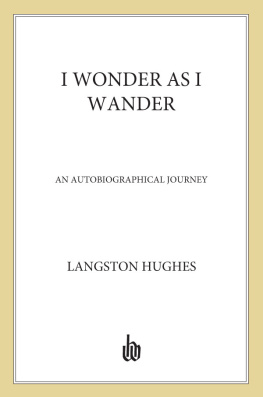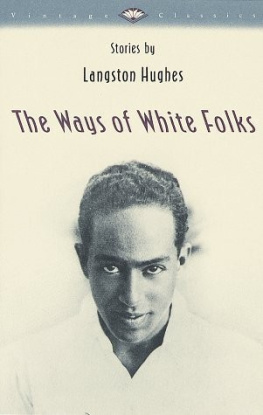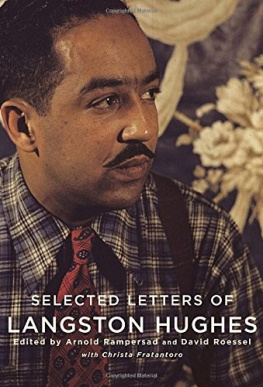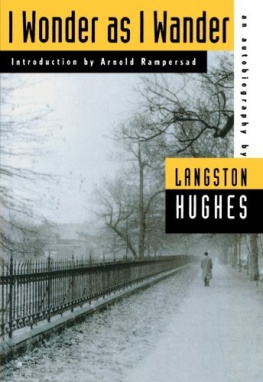Rampersad - Life of Langston Hughes, Volume II
Here you can read online Rampersad - Life of Langston Hughes, Volume II full text of the book (entire story) in english for free. Download pdf and epub, get meaning, cover and reviews about this ebook. City: USA, year: 2002, publisher: Oxford University Press, genre: Detective and thriller. Description of the work, (preface) as well as reviews are available. Best literature library LitArk.com created for fans of good reading and offers a wide selection of genres:
Romance novel
Science fiction
Adventure
Detective
Science
History
Home and family
Prose
Art
Politics
Computer
Non-fiction
Religion
Business
Children
Humor
Choose a favorite category and find really read worthwhile books. Enjoy immersion in the world of imagination, feel the emotions of the characters or learn something new for yourself, make an fascinating discovery.

- Book:Life of Langston Hughes, Volume II
- Author:
- Publisher:Oxford University Press
- Genre:
- Year:2002
- City:USA
- Rating:3 / 5
- Favourites:Add to favourites
- Your mark:
- 60
- 1
- 2
- 3
- 4
- 5
Life of Langston Hughes, Volume II: summary, description and annotation
We offer to read an annotation, description, summary or preface (depends on what the author of the book "Life of Langston Hughes, Volume II" wrote himself). If you haven't found the necessary information about the book — write in the comments, we will try to find it.
Life of Langston Hughes, Volume II — read online for free the complete book (whole text) full work
Below is the text of the book, divided by pages. System saving the place of the last page read, allows you to conveniently read the book "Life of Langston Hughes, Volume II" online for free, without having to search again every time where you left off. Put a bookmark, and you can go to the page where you finished reading at any time.
Font size:
Interval:
Bookmark:
I Dream a World
Volume II: 19411967
I Dream a World
SECOND EDITION
Arnold Rampersad


Oxford New York
Athens Auckland Bangkok Bogot Buenos Aires
Cape Town Chennai Dar es Salaam Delhi Florence Hong Kong
Istanbul Karachi Kolkata Kuala Lumpur Madrid Melbourne Mexico City Mumbai
Nairobi Paris So Paulo Shanghai Singapore Taipei Tokyo Toronto Warsaw
and associated companies in
Berlin Ibadan
Copyright 1988, 1989, 2002 by Arnold Rampersad
First published by Oxford University Press, Inc., 1988
First issued as an Oxford University Press paperback, 1989
198 Madison Avenue, New York, New York 10016
Oxford is a registered trademark of Oxford University Press
All rights reserved. No part of this publication may be reproduced, stored in a retrieval system,
or transmitted, in any form or by any means, electronic, mechanical, photocopying, recording,
or otherwise, without the prior permission of Oxford University Press.
Library of Congress Cataloging-in-Publication Data is available:
ISBN 13: 978-0-19-514643-1
Printed in the United States of America on acid-free paper
again, to
Marvina White
Politics can be the graveyard of the poet. And only poetry can be his resurrection.
LANGSTON HUGHES, 1964
THE LIFE OF LANGSTON HUGHES
STILL HERE
1941
Ive been scarred and battered.
My hopes the wind done scattered
Still Here, 1941
ON FEBRUARY I, 1941, his thirty-ninth birthday, Langston Hughes was released from the Peninsula Community Hospital in Monterey, California, after almost three weeks there. By this time, the disturbing illness that had forced him to seek admissionan attack of gonorrhea marked by an almost free-flowing urethral discharge, aches and pains in his legs, an excruciating locking of his left knee, and feverwas in remission. But on the day of his release he was still weak and groggy, with his temperature not quite returned to normal. He had allowed his infection to go too far before seeking treatment. Large doses of sulfathiazole and then sulfapyridine, the standard medication for venereal disease in the era before the discovery of penicillin, had left him constipated, depressed, and confused at times almost to the point of deliriumwithout doing much to curb the urethral flow. Finally, in a painful procedure, his physician had inserted a catheter with tenderness & caution!! in order to drain the discharge, which finally stopped.
The day was cool, the sky above the Monterey Peninsula murky with rain and winter mists when Langston rode from the hospital to the grounds of his friend and patron Nol Sullivans estate, Hollow Hills Farm, some five miles away in Carmel Valley. Since September, he had been living there as a guest of Sullivans in a one-room cottage built especially for him, where he could write and sleep free from most distractions. Now, however, he unpacked in an upstairs room in the main house where, over the next two weeks or so, he would nurse himself back to health. The room was comfortable, and soothingly decorated entirely in blue. On a side table was a gift sent from New York by his loyal friend Carl Van Vechtena flowering plant, a kind of glowing little tree growing out of white pebbles in a white pot, as Langston gratefully described it. The very lovely gay and joyous plant, he wrote, made the room seem like spring in full bloom in spite of the rain outside.
An accompanying card said simply, Pour la vie. Nothing could have been more appropriate as a gift to Langston at this point than a symbol of life. In the middle of his own life he had stumbled and fallen so badly that he himself must have despaired at times of ever rising again. In America, the bitter saying goes, there are no second acts; would the curtain rise again for him? What weighed most on his mind now was not his illness, indelicate as it was, but something worsethe momentous step he had taken, just before entering the hospital, in repudiating one of his poems, Goodbye Christ. A harsh attack on religious hypocrisy, the poem had been penned in the Soviet Union soon after Langstons exuberant arrival there in 1932 with a band of young black Americans summoned to make a film on American race relations, and had been published the same year without his permission, by a radical friend:
Goodbye,
Christ Jesus Lord God Jehova,
Beat it on away from here now.
Make way for a new guy with no religion at all
A real guy named
Marx Communist Lenin Peasant Stalin Worker ME
I said, ME!
Forgotten for seven years, the piece had reappeared with almost diabolical timing the previous November when, after a number of professional setbacks, Langston had looked forward eagerly to a major address to an audience of booklovers about his freshly published autobiography The Big Sea. But his talk at a hotel auditorium in Pasadena, California, had been raucously sabotaged by a right-wing religious group stirred to action by the nationally known evangelist Aimee Semple McPherson. Thus McPherson had repaid Hugheswith ample interestfor a passing shot at her in the poem. Next, the powerful and widely circulated Saturday Evening Post reprinted the piece of verse along with Aimee McPhersons counterattack, and dispatched them both into homes across the country. (By curtly refusing one of his radical poems in 1932, Good Morning Revolution, the Post had earned itself a place in Goodbye Christ: Christ had been sold Even to the Tzar and the Cossacks, / Even to Rockefellers Church, / Even to THE SATURDAY EVENING POST.)
The result was a squall of controversy with Langston Hughes at the center. Lots of wires, a Mountain of mail, and newspaper Clippings by [the] ton commenting on the poem began to descend on Hollow Hills Farm. Only a portion of this material had reached Hughes when, fearing that his entire career as a writer was in jeopardy, he took a decisive step. Bowing to his critics on the right, he drew up and circulated an explanation that dismissed Goodbye Christ as a regrettable error of his immature youth, an error that he would not repeat. Having left the terrain of the radical at twenty to approach the conservative at forty, and desiring no longer to pater le bourgeois, he insisted that he would not and could not write such verse any more.
This statement amounted to a public repudiation of his alignment with radical socialism in the entire preceding decade, beginning with powerful poems in 1931 in New Masses against imperialism in the Caribbean and reaching its zenith with the militant verse of his Soviet year, of which Goodbye Christ was only the most profane. Spurning moderation in the Scottsboro Boys cause clbre, when nine black young men faced the death penalty on flimsy charges of rape, he had thrown in his lot with the communist lawyers and propagandists confronting the Alabama judical system. A year in the Soviet Union had intensified the appeal of radical socialism, although he never joined the Communist Party. As a newspaper correspondent in the Spanish Civil War, he had been impartial in theory but sympathized clearly with the extreme left. As late as 1938, he had signed a statement in the communist Daily Worker about recent Moscow trials, a statement that asked liberals to support the efforts of the Soviet Union to free itself from insidious internal dangers, principal menace to peace and democracy. Now he had broken with the radical leftwhich reacted with disdain. Citing one of his more militant pieces of verse, the San Francisco
Next pageFont size:
Interval:
Bookmark:
Similar books «Life of Langston Hughes, Volume II»
Look at similar books to Life of Langston Hughes, Volume II. We have selected literature similar in name and meaning in the hope of providing readers with more options to find new, interesting, not yet read works.
Discussion, reviews of the book Life of Langston Hughes, Volume II and just readers' own opinions. Leave your comments, write what you think about the work, its meaning or the main characters. Specify what exactly you liked and what you didn't like, and why you think so.






